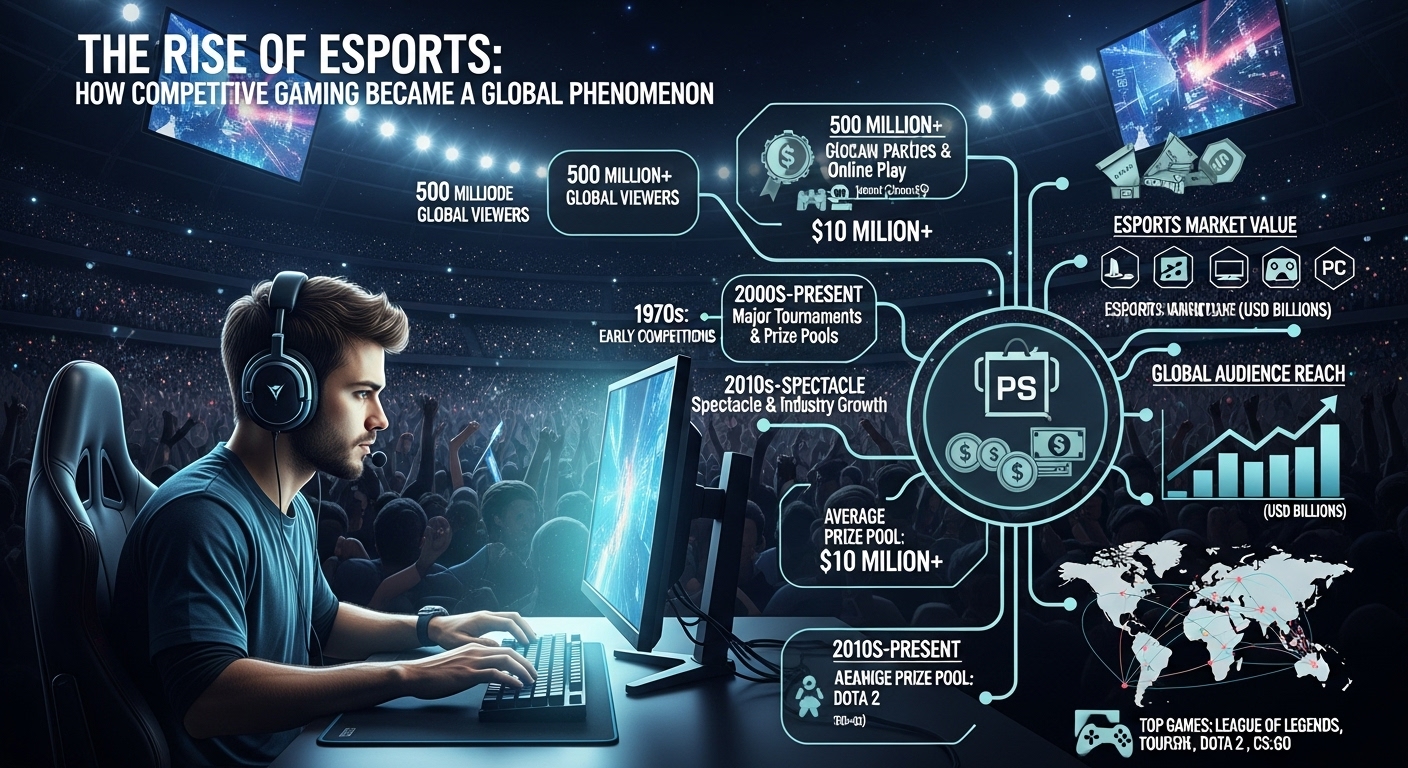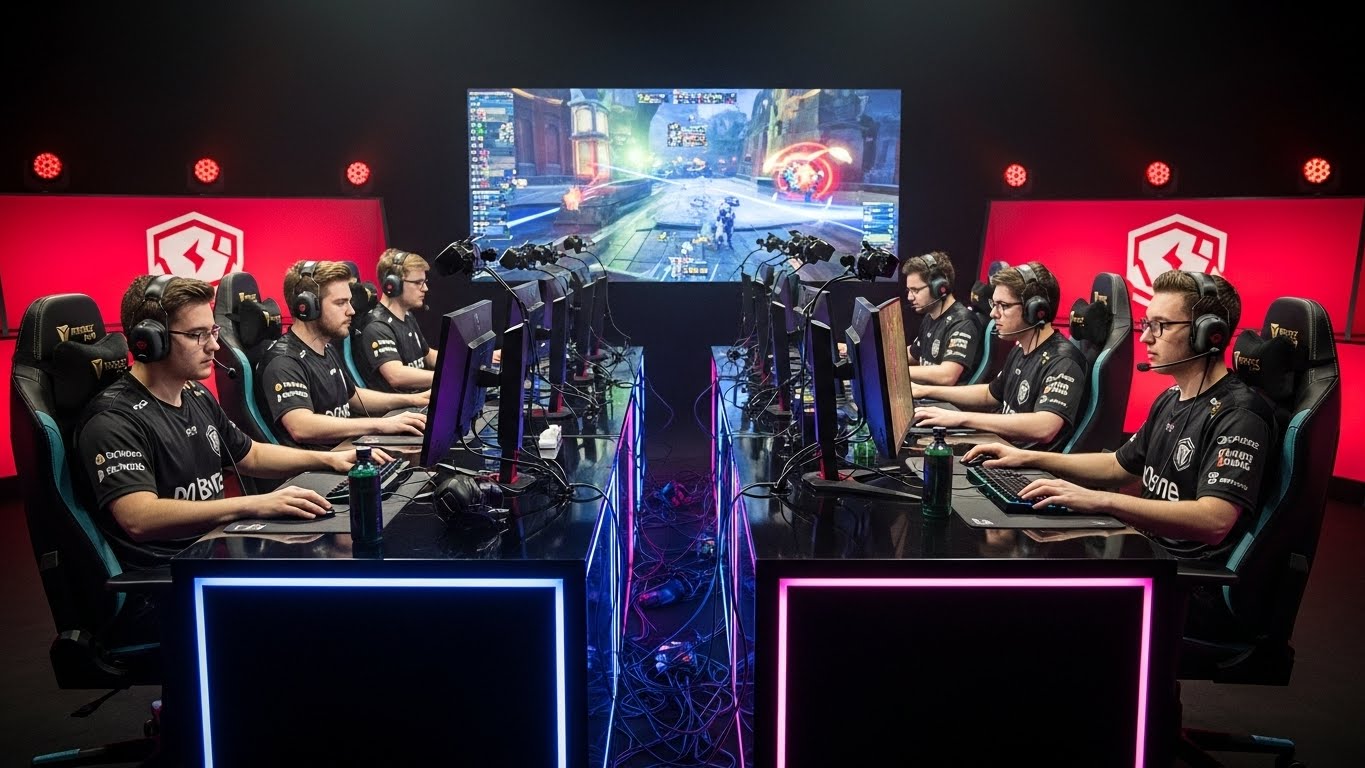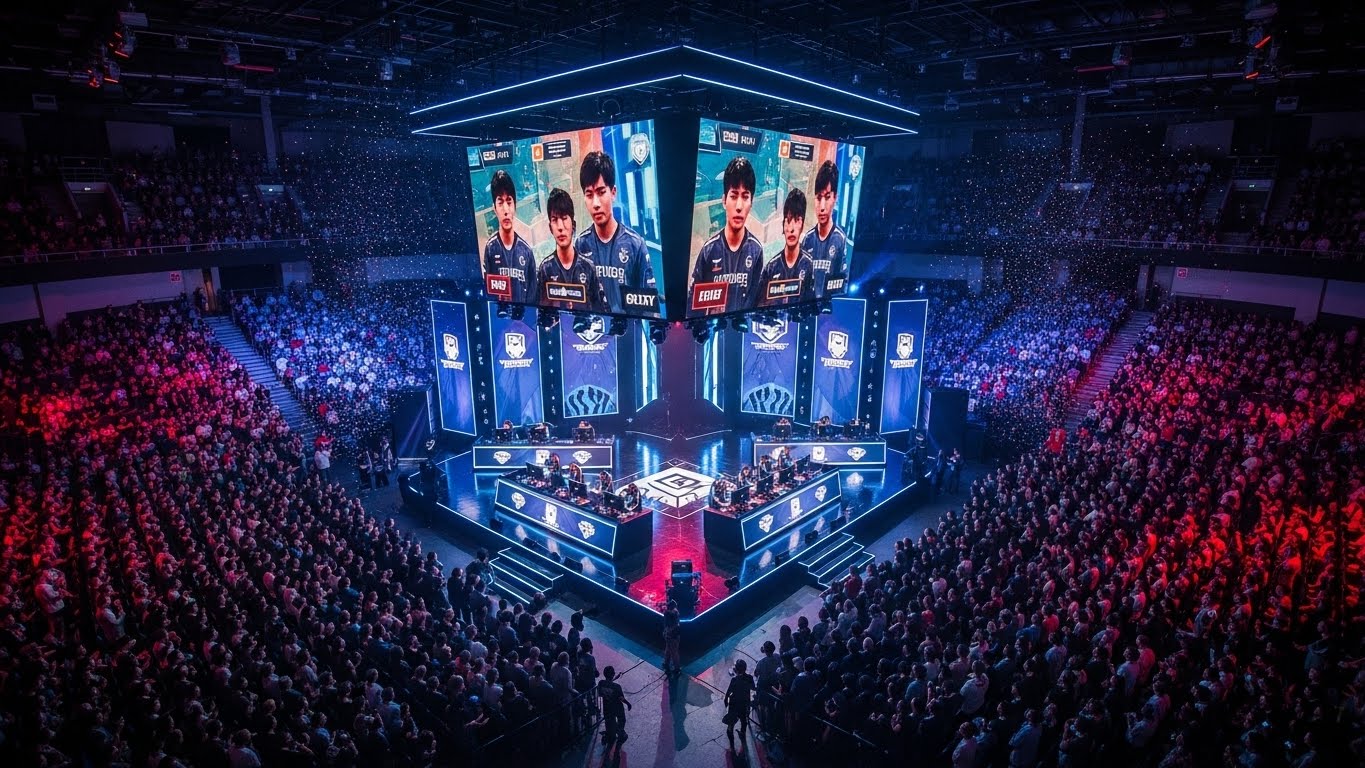Introduction
Esports, short for electronic sports, has evolved from a niche activity enjoyed by small communities into one of the most influential industries in global entertainment. What began as friendly competitions among gamers has now turned into a billion-dollar market, attracting millions of viewers, investors, and professional players. The rise of esports marks a new chapter in the way humans interact with technology, compete, and consume entertainment. It represents a fusion of culture, technology, and skill that has redefined the boundaries of traditional sports.
In the early 2000s, competitive gaming was seen as a hobby for enthusiasts. Today, it has become a global movement with professional teams, tournaments, sponsorships, and massive prize pools. The journey of esports from its humble beginnings to the mainstream spotlight is a fascinating story of innovation, community, and ambition.
The Origins of Esports
The concept of competitive gaming can be traced back to the late 1970s and early 1980s. Early arcade games like Space Invaders and Pac-Man laid the foundation for organized competitions. One of the first recognized gaming tournaments took place in 1980, when Atari hosted the Space Invaders Championship in the United States. This event attracted thousands of participants and demonstrated that video games could bring people together through competition.
As technology advanced in the 1990s, personal computers and home consoles became more accessible. Games such as Doom, Quake, and StarCraft introduced multiplayer modes that allowed players to compete over local networks and, eventually, the internet. These developments transformed gaming from a solitary activity into a shared experience. Online gaming communities began forming around these titles, and the concept of esports began to take shape.
The 2000s: The Birth of Modern Esports
The early 2000s were a turning point for competitive gaming. The rise of broadband internet and online multiplayer games like Counter-Strike, Warcraft III, and Halo made it possible for players around the world to compete in real time. Professional tournaments began to emerge, and organizations started forming teams to represent them in various competitions.
South Korea played a particularly significant role in shaping modern esports. The country’s investment in high-speed internet infrastructure and its cultural embrace of gaming led to the birth of televised esports leagues. Games like StarCraft: Brood War became national phenomena, with professional players achieving celebrity status. Dedicated esports arenas and television channels helped legitimize gaming as a professional pursuit.
By the mid-2000s, global tournaments such as the World Cyber Games (WCG) and the Electronic Sports World Cup (ESWC) began to attract international audiences. Players competed for significant cash prizes, and sponsors began recognizing the marketing potential of esports. What was once considered a pastime had now become a legitimate career for some of the world’s best gamers.
The Role of Technology in Esports Growth
The rapid evolution of technology has been one of the main drivers of esports growth. High-speed internet, powerful gaming hardware, and streaming platforms have made it easier than ever for players to participate and for fans to watch. The emergence of platforms like Twitch and YouTube Gaming revolutionized esports broadcasting by allowing fans to stream tournaments live from anywhere in the world.
Streaming has not only democratized access to esports but also allowed for the creation of personalities and influencers within the community. Professional players, commentators, and content creators have built large followings, contributing to the overall popularity of competitive gaming. This accessibility has helped esports reach audiences that traditional sports could not, especially younger generations who grew up in the digital age.
Major Esports Titles and Their Communities
Esports encompasses a wide variety of games, each with its unique mechanics, culture, and fanbase. Some of the most influential esports titles include League of Legends, Dota 2, Counter-Strike: Global Offensive, Fortnite, Overwatch, and Valorant. Each of these games has its own competitive ecosystem, complete with professional leagues, world championships, and massive online communities.
League of Legends (LoL), developed by Riot Games, is one of the biggest esports titles globally. The annual League of Legends World Championship draws millions of viewers, rivaling traditional sporting events in audience size. Similarly, Dota 2’s The International has become famous for its enormous prize pools, funded largely by the game’s community.
First-person shooter games like Counter-Strike and Call of Duty have also maintained strong competitive scenes for decades. Their simple yet skill-based gameplay continues to attract both players and spectators. Meanwhile, battle royale games such as Fortnite and PUBG have introduced new dynamics to the esports world, combining large-scale multiplayer action with strategy and creativity.
The Professional Esports Scene
The structure of professional esports mirrors that of traditional sports in many ways. Teams are formed under organizations that provide salaries, sponsorships, and training facilities for their players. Coaches, analysts, and support staff work behind the scenes to prepare teams for competition. Players often dedicate countless hours to practice, refining strategies, communication, and mechanics.
Esports tournaments range from local competitions to global championships featuring multimillion-dollar prize pools. Events like The International, League of Legends Worlds, and CS:GO Major Championships attract millions of live viewers and fill large arenas. These events are not just competitions but full-fledged spectacles, complete with elaborate stage designs, commentary, music, and entertainment.
The professionalization of esports has also led to the creation of career pathways for players, commentators, hosts, and production staff. Universities now offer esports scholarships, and academic programs focused on game design and management are emerging worldwide. This institutional support signifies the growing recognition of esports as a legitimate industry.
The Global Reach and Cultural Impact
Esports transcends national and cultural boundaries. It unites people from diverse backgrounds through shared passion and competition. Fans from across the globe support their favorite teams and players, often forming online communities that interact daily. This digital connectivity has fostered a sense of belonging among gamers and fans alike.
Countries such as South Korea, China, the United States, and Sweden have become major centers of esports activity. International tournaments often feature teams from multiple continents, emphasizing the truly global nature of the industry. The cultural impact of esports is also evident in popular media, fashion, and even music, as collaborations between game developers, musicians, and brands continue to grow.
The Business of Esports
Behind the thrilling matches and enthusiastic crowds lies a massive business ecosystem. Esports generates revenue through sponsorships, advertising, ticket sales, merchandise, and media rights. Major companies such as Intel, Coca-Cola, and Nike have invested heavily in esports sponsorships, recognizing the potential of reaching younger, tech-savvy audiences.
Game publishers play a central role in managing and funding esports leagues. For example, Riot Games operates the League of Legends Championship Series, while Valve organizes The International for Dota 2. These publishers not only profit from the tournaments themselves but also from increased game sales and in-game purchases driven by fan engagement.
Media companies and streaming platforms also benefit from esports’ popularity. Broadcasting rights for major tournaments are highly valuable, as millions tune in to watch live matches. The esports economy continues to expand rapidly, with analysts predicting further growth as technology and audience engagement evolve.
Challenges Facing Esports
Despite its tremendous success, esports faces several challenges that could impact its future. One major issue is player burnout. Professional gamers often face intense training schedules, leading to physical and mental exhaustion. Unlike traditional athletes, esports players can experience shorter careers due to repetitive strain injuries or psychological stress.
Another challenge lies in regulation and governance. Because esports is global and decentralized, establishing consistent rules and standards can be difficult. Issues such as cheating, match-fixing, and doping have occasionally surfaced, prompting the need for stricter oversight. Some organizations are now working toward creating unified governing bodies to ensure fair play and player welfare.
The industry also faces diversity and inclusion challenges. While esports is accessible to anyone with an internet connection, the professional scene has often been criticized for a lack of female representation and inclusivity. Many initiatives are now underway to promote diversity and make esports a more welcoming environment for all participants.
The Future of Esports
Looking ahead, the future of esports appears bright and full of potential. As technology continues to evolve, so will the possibilities for interactive entertainment. Virtual reality (VR) and augmented reality (AR) could revolutionize the way esports are played and watched, offering more immersive experiences for both players and audiences.
The integration of artificial intelligence (AI) and data analytics will also enhance team strategies and viewer experiences. Teams can use data to analyze player performance and opponent behavior, while broadcasters can use AI to provide real-time insights during matches.
Esports may also become an official part of major international sporting events. Discussions have already begun about including esports in the Olympic Games, recognizing it as a legitimate form of competition that requires skill, teamwork, and strategy.
Educational institutions and governments are also expected to play a larger role in supporting esports. With scholarships, training programs, and investment in gaming infrastructure, esports could become a vital part of future digital economies.
The Human Element of Esports
Beyond the technology and business, esports is ultimately about people. It is about the players who dedicate their lives to mastering their craft, the fans who cheer passionately for their teams, and the communities that grow around shared love for gaming. Esports has given countless individuals a platform to express creativity, determination, and teamwork.
The stories of professional players often inspire millions. From humble beginnings to global fame, many players have overcome challenges, proving that dedication and skill can turn dreams into reality. Esports has created new heroes for a generation that grew up online, offering role models who represent not just athleticism but intellect and adaptability.
Conclusion
Esports has evolved far beyond its roots as a hobby. It is now a cultural, technological, and economic force that influences millions worldwide. It bridges the gap between entertainment and competition, creating a new arena where skill, strategy, and passion meet. As esports continues to grow, it will undoubtedly shape the future of how humans engage with digital entertainment.
What was once a small community of passionate gamers has become a global phenomenon, proving that competition knows no boundaries—whether on the field, in the ring, or behind a keyboard. Esports represents the future of sports in the digital age, where innovation, talent, and community come together to create something extraordinary.



